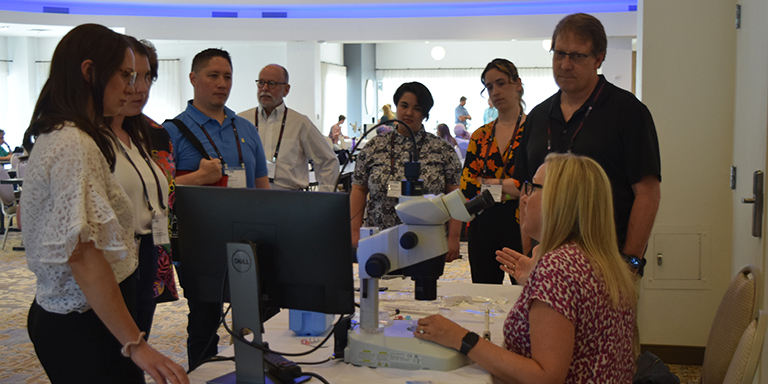
Newsletter
The College of Reproductive Biology (CRB) is a not-for-profit special interest group of the American Association of Bioanalysts (AAB).

Legislative Committee
Eva Schenkman, M.Sc., TS(ABB)
The Legislative Committee has been focused on two agenda items. One is assembling a spreadsheet on licensing regulations for Embryologists/Andrologists in each state. The second item we have been focusing on is tracking the current status of legislation in the United States.
We have all heard about the “Personhood Movement” in this country, and its potential impact on Assisted Reproductive Technology. This definitely needs to be closely watched, but are you aware of the other statutes that may affect our field? Personhood statutes are not the only ones we need to be concerned with. After a review of pending cases, I have included a few here for our members to be aware of:
“Embryo Statute Law” Ariz. Rev. Stat. § 25-318.03 (LexisNexis 2018) also known as the Embryo Statute states that Arizona judges must award embryos to the spouse that will give them the best chance for the IVF embryos to develop to birth. It prohibits judges from considering any prior agreement between the parties. This statue is far-reaching, with other states legislatures including NM introducing restrictions on how frozen embryos must be treated. Fortunately, the Arizona statue was not retroactive, so its ultimate fate is still unknown.
“Lost Embryo Litigation” I am sure we have all had the unfortunate result when a frozen embryo fails to survive the thaw, and cannot be found on the straw. Well, recently, the issue of “not being found” has become the subject of litigation. Was the embryo taken, was it ever even loaded? How could it “not survive” if we did not find the remnants. We are routinely asked to transport and thaw embryos cryopreserved with protocols we may not be familiar with or on devices that are not our typical device. Clinics should be wary of accepting embryos from other clinics that may be frozen with different protocols or on devices that they are unfamiliar with. In Orange County, the patient sued after they were told the embryos were thawed, but “could not be found." According to the brief filed for this case, “But, shockingly, not only was there no sign of the embryos, but there was not even any sign of any embryo debris to suggest that the embryos had ever been in the straw in the first place.” This brings up an interesting point, as Embryologists, how can you “prove” you loaded the embryo on the straw? Do you use a human witness for the actual loading or just to confirm the identity of the straw?
“Down Syndrome Abortion Ban” While this area of legislation may not completely affect IVF, it certainly brings up concerns over a patient's right to terminate an affected pregnancy, and it may lead to more PGT-A being performed giving the patient that right to choose prior to transfer. 2021 has unfortunately been a breakthrough year for legislation in several states to prohibit terminations solely based on a prenatal diagnosis. While Roe v Wade legalized any abortion before the fetus could survive outside the mother womb ( generally around 24 weeks), recent legislation has been introduced in multiple states to severely restrict the procedure. According to statistics, on average about 67% of pregnancies diagnosed with Down syndrome are terminated. Recently, severe restrictions have been signed into law in Arizona and Ohio. The Arizona law calls for felony charges against doctors who perform an abortion based on diagnosis of Down syndrome or other genetic abnormalities, as does the Ohio law. A Federal Appeals court has recently upheld the law in Ohio. This law will also prohibit doctors from performing an abortion due to the genetic abnormality if the patient reveals she is motivated by fears that fetus will have Down syndrome. This may promote a reason why patients should use PGT-A to screen their embryos prior to transfer; it is certainly something we should be counseling our patients on. That if they get pregnant with an affected pregnancy in certain states, they may be legally prevented from determining the course of their pregnancy. Even worse, if they confide their true feelings/concerns to their physician, their physician will be held criminally liable if proceeding with a termination.
Credentialing and Membership Committee ⇒CRB News Articles
06/24/2020
Vol 10, No. 1
06/24/2021
From The President
06/24/2021
Meeting Committee
06/24/2021
Legislative Committee
06/24/2021
Credentialing and Membership Committee - Survey on Impact of COVID-19
06/24/2021
Publication Committee
06/24/2021
2021-2022 CRB Officers and Board Members
06/24/2021
Earn ABB/PEER CE Credit Attending Select 2021 ASRM Virtual Post-Graduate Courses
06/24/2021
2022 CRB Symposium, May 11-14
06/24/2021
Preventing Cryostorage Failure: What Have We Learned?
06/24/2021
Digital QA - The Future of ART Lab Management
06/24/2021
Board Certification for Andrology and Embryology Laboratory Professionals
CRB Standing Rules - Log in to view



